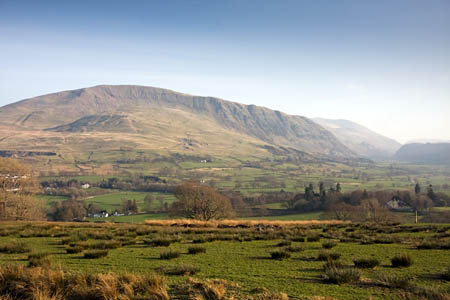Outdoor campaigners gave a mixed reaction to the publication of the coalition Government’s new planning guidelines.
The Ramblers said they cautiously welcomed the national planning policy framework and the National Trust, whose members were at the forefront of challenging much of the draft policy when it was first published, said the Government had listened to the public’s concerns.
But the Open Spaces Society said the new ‘local green space’ designation was too restrictive and the Woodland Trust said the framework left ancient forests at risk.
The Ramblers said they needed to analyse the policy framework in detail, but welcomed some of its provisions. The walkers’ charity said it was pleased that local planning authorities have been directed to improve public access to and enjoyment of the coast.
However, the organisation was guarded about aspects of the policy, saying: “Some questions remain as to whether local authorities will be able to produce and keep up to date the local plans which are to form the backbone of the new framework and the impact that this could have on local planning issues.”
Nicky Philpott, Ramblers director of policy and campaigns, said: “The Ramblers are pleased that the Government has listened to some of the public’s concerns about protecting the spaces where we walk, rest and play, and that the minister affirmed his commitment to a vision of sustainable development which includes the environment.
“Britain’s walking charity also welcomes the recognition of the importance of sustainable transport, protecting and enhancing the path network and the direction to local authorities to improve public access to and enjoyment of the coast.
“However, further in-depth study of the framework is needed in order to assess whether it provides the protection walkers, and the wider public, want to see for our local landscapes and green spaces and the Ramblers will now be looking into these areas in detail.”
The National Trust, which mobilised a large number of its members in opposing the original draft, said it welcomed improvements the Government had made.
Outgoing director-general Dame Fiona Reynolds said: “There are a number of important changes that have been made to the draft, responding to concerns that we and others raised.

Dame Fiona Reynolds: 'Now the serious business begins'
“These include: the primacy of the plan is confirmed, ensuring that development must be consistent with the plan; a better definition of sustainable development, based on the 2005 sustainable development strategy; the insertion of references to the use of brownfield land and the need to promote town centres; removal of the incendiary default ‘yes’ to development where there is no plan.”
She also welcomed the reference to the ‘intrinsic character and beauty of the countryside’, recognising the importance of countryside outside designated areas and confirmation that existing plans will remain in force while the new NPPF is introduced, and that there will be a one-year transition for the preparation of new plans
“All these changes improve the document and give it a better tone and balance,” she said.
“Now the serious business of planning begins. The country needs huge effort at a local level to get plans in place that properly reflect the integration of social, economic and environmental goals, and protect places people value.
“The National Trust, along with many other organisations and people, will play our part and watch to see how it works in practice.
“Over 230,000 people signed our petition against the draft NPPF – a sign of the huge public concern it generated. Now we owe it to them and future generations to get good plans in place to deliver the improved ambitions set out in the new document.”
The Open Spaces Society said it was concerned that designation as local green space confers no right for the public to use and enjoy such land.
And local people will have a limited opportunity to use the new provision, since the space can only be designated when a local or neighbourhood plan is prepared or reviewed, it added.
Case officer Nicola Hodgson said: “This designation is unlikely to produce many new protected areas because of the severe restrictions placed on its use.
“There is a multitude of restrictions on the land which can be designated. It must be in reasonably close proximity to the community it serves, it must hold a particular local significance, it must be local in character, and it cannot be an extensive tract of land.
“It is so shackled as to be practically useless.
“Even if land is designated, it will not be protected. It will receive the same treatment as green belts, where buildings for agriculture and forestry, facilities for outdoor sport, replacement of a building, limited infilling and other development may be allowed. This is deeply worrying.
“We believe it will be difficult for communities to make use of the local green space designation as there is no explanation of the process.
“It is a missed opportunity for a government which claims to be ‘the greenest government ever’.”
The Woodland Trust sounded a note of alarm on England’s ancient woodlands. It said: “The draft NPPF transferred phrasing from existing planning policy around the protection of ancient woods and trees, which was welcome.
“In the final document the default ‘yes’ to development has been removed. However, the final NPPF also retains the loophole that planning applications should not bring about the loss of these habitats ‘unless the need for, and benefits of, the development in that location clearly outweigh the loss’, leaving a dangerous loophole which is completely inadequate for ancient woodland.”
Ancient Woodland is land that has been continuously wooded since 1600. The Woodland Trust describes it as ‘the UK’s equivalent of the rainforest’.
Chief executive Sue Holden said: “Ancient woodland remains significantly threatened under this new framework.
“In pushing through this framework the Government has not delivered on its promise to ensure full and proper protection for ancient woodland.
“The wording gives with one hand and takes away with the other. Ancient woodland is rare, irreplaceable, and home to more wildlife of conservation concern than any other land habitat in this country.
“The retention of the loophole leaves the habitat and all the wildlife that depends on it endangered. It will undermine efforts to protect this precious resource for years to come.
“Although there is recognition elsewhere in the document of the need for the planning system to promote habitat creation which we very much welcome, the planting of new habitat cannot compensate for those such as ancient woodland, which are irreplaceable.”
The national planning policy framework will apply only in England.
